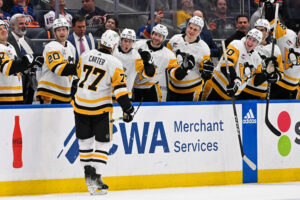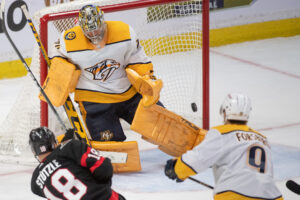Goaltending issues for the San Jose Sharks have been front and center both last season and this. The team’s lead netminder, Martin Jones, has come under enormous scrutiny. His play has been inconsistent, going on close to 100 games now.
The Play of Martin Jones
Being inconsistent is just that. It doesn’t mean Jones can’t play well. Indeed, he’s started the last six games for the Sharks, all wins. His play has improved from early in the season, yet his numbers remain specious. He’s allowed 17 goals in the six games, a goals against average of 2.76 and a save percentage of .891.
In his most recent start, Jones was deservedly the game’s third star, despite allowing three goals on just 25 shots. In the game, Jones faced plenty of high danger shots, was excellent during a penalty kill in overtime and perfect in the shootout. The numbers may be specious, but they only tell part of the story.
Historically, November has been a good month for Jones. He is playing better than he did last month, but this isn’t much of an endorsement. In two of his four NHL seasons as a starter, November was his best month of the season (as measured by save percentage).
Martin Jones Minutes
No NHL goalie has played as many meaningful minutes over the last few seasons as Jones. He joined the Sharks and became the team’s full-time starter in the 2015-16 season, the same season Peter DeBoer took over as head coach. DeBoer has put enormous trust in Jones the entire time.
Beginning with the 2015-16 season, Jones is second in regular season minutes played (behind only Devan Dubnyk) and first in playoffs minutes. The combined total has Jones well ahead of everyone else in total playing time. Indeed, only two other goalies are even in the general vicinity of Jones workload. Jones has played the equivalent of 15 more games than the second and third most used goalies, Braden Holtby and Pekke Rinne. Dubnyk, the league’s fourth most used goalie, has played the equivalent of 42 fewer games (roughly 2/3 of a regular season’s worth of games for a goalie).
There’s been plenty of analysis done on Stanley Cup winning netminders (I’ll lay claim to being among the first to identify this trend). Simply put, goalies heavily used in the regular season aren’t leading teams to Stanley Cup wins. Can goalies can be overused? The evidence says ‘yes’.
A quarter of the way into the 2019-20 season, Jones is on track to start a similar number of games as he has in each of his four prior seasons under DeBoer (60-65 starts).
Martin Jones Performance
Martin Jones, at his best, has been slightly better than a league average goalie during the regular season. He’s made his mark by turning in playoff performances which have been strong (for the most part) and in some cases, stellar. Last season was by far his worst regular season and he ranked among the league’s worst netminders with a save percentage of .896. Some attributed this to a leaky defence. The reality is the Sharks fixed their major defensive issues about a third of the way through the season. The team’s defence improved while Jones did not.
This season is looking a lot like last season. Jones has been hung out to dry far too often, but he’s also been part of the problem. His .886 save percentage is actually worse than last season. Among netminders with double digit games played this season, Jones save percentage is near the bottom.
Martin Jones And Rest
With Jones, we’ve seen trends which suggest he plays better when rested. For example, last season, his strongest stretch came after the 10-day All-Star break. In another season, he posted his best save percentage in November. And in every month for the rest of the season, his save percentage was lower than in the month before.
In yet another season, he had two poor outings in the season’s first two games, then reeled off 15 strong games in a row, a period where he was perhaps the league’s best netminder.
Does Jones do better when rested? The evidence is better than anecdotal. Alas, this isn’t quite the right question.
Short-Term Versus Long-Term Questions
The right question is this: Is Martin Jones breaking down? This question is critical to the future of the team, as Jones is signed to a long-term deal at a premium price. This is not simply a matter of giving Jones a week off. It is a matter of his ability to stay strong and focused over the course of a season. If he is breaking down, he’ll need a lot less use.
The answer is not clear cut, but there is enough evidence to raise the issue and consider the options.
Assuming Yes
If the answer to the question is yes, the obvious response is to play Martin Jones less. A lot less. We’ve seen what happens when goalies break down in a major way. Notables include Cory Schneider and Jonathan Quick. There is every reason to keep Jones from falling into this group.
There is, however, a problem with this idea. Significantly reducing Jones’ game totals is simpler to do with a trustworthy back-up netminder. The Sharks do not have one of these (to be fair, even when they did, the team still used Jones aggressively).
The Sharks back-up netminder is Aaron Dell. Dell has been highly inconsistent. He’s been good at stopping initial shots, but has kicked out rebounds in quantity and his rebound control has been more than suspect. Far too many rebounds have resulted in quality chances for opponents.
Dell has shown ability which means there is hope. He positively stole a game versus the Montreal Canadiens earlier this season. But then he followed it up with a pair of troubling performances. This follows a problematic season in 2018-19, where he posted a miserable .886 save percentage. Alas, he’s slightly worse so far this season, at .878.
Assuming No
If the answer to the base question is no, then there is no obvious response. The player is fine and yet performing at a low level. Can he play himself back into performing at a high level? Possibly, but Jones’ struggles have been going on for over a year now and if he was going to play his way out of it, one imagines it’d have happened by now.
The good news is, good goalies do have bad stretches, even bad seasons. Pekka Rinne is considered among the league’s best netminders, but a look at his career shows some poor seasons in the mix. Jones, though, is looking at being among the league’s worst netminders in back-to-back seasons. This is a different level of problem.
The Sharks Path Forward
Can the Sharks extract themselves from this situation? Possibly. The first thing which needs acknowledging is this: there is no ‘low-risk’ path.
Play Jones as the team has been doing and hope he returns to form might work. DeBoer has ridden Jones (rightly so) during the six-game win streak. But if Jones is indeed breaking down from the enormous workload over 4+ seasons, the downside risk is enormous and it’ll show at some point.
The better choice is to give Dell a lot more starts and hope he finds his game. This gives Jones more rest within a season and there’s at least a few case studies which show this can work. Tuukka Rask saw his workload fall off last season, then took his team to the Stanley Cup Final. The season before, Braden Holtby was used less, falling behind Philipp Grubauer as the team’s starter. Holtby returned to the net early in the playoffs and led his team to the championship.
Playing Dell more also carries risk. Perhaps he is what he is and he fails to show meaningful improvement by giving him the net. This leaves the Sharks with subpar netminding. It is faint praise, but at least Dell’s play isn’t much worse than Jones’. The team can succeed in the regular season even with subpar netminding – as long as its only a bit subpar.
Goalies Not on the Sharks Roster
The other option is to get another goalie, whether from within the organization or from outside. The ‘within’ option is Josef Korenar. He is playing well for the San Jose Barracuda (his statistics are skewed by one game where he allowed nine goals), at one point holding opponents scoreless for 170 minutes. Korenar is just 21 and probably not ready for his NHL debut. Bringing in someone from outside could work, but is hardly a sure thing. No one wants to help the Sharks out of their struggles. Nonetheless, names are being floated.
The Sharks have options, but the choices aren’t pretty.
No Easy Solutions
The Sharks are tied to Jones. If he can return to form, he’ll earn his contract. If he can not, he won’t be movable. No one is in the market for a goalie with a sub .900 save percentage. Let alone one with a lengthy and pricey contract.
The Sharks need to fix Jones. Repeatedly, more work has not been the answer. The answer may come from Aaron Dell, but it seems unlikely for two reasons. First, Dell isn’t playing well and second, the Sharks seem reluctant to take the risk.
I’d rather take the risk on Dell (or someone else) and hope he delivers. This is the best chance the team has to bring Jones back to his longer-term potential. And it’s the best shot at preventing Jones from breaking down. Continuing the status quo is not a good idea, downside risk is too large.
The bottom line is simple, solutions are not. The Sharks record of 10-10-1 means they will need to play well for a major portion of the season to make the playoffs. The offensively gifted Sharks may not require elite goaltending, but the goaltenders will need to be better, consistently better, than they’ve been.
With the six consecutive wins, the season is no longer on the brink of failure, but adding risk is uncomfortable. Sitting Jones feels risky, but maintaining the status quo carries its own substantial risk. Low risk solutions have left the building.
Zeke’s Notes
• In an earlier piece, we highlighted Barclay Goodrow. His star remains ascendant. Goodrow is now a top-six forward and he delivered a Gordie Howe hat trick in the Sharks win over the Edmonton Oilers.
• We’ve also (critically) discussed Peter DeBoer’s approach of using five defencemen for long stretches of a game. Perhaps no game has illustrated this point better than the Sharks recent 6-5 win over the Minnesota Wild. The Sharks led 4-0 when Mario Ferraro went out injured at the game’s midpoint. With DeBoer forced to go with five defencemen, the Sharks were outscored 5-2 the rest of the way. With the return to the line-up of Radim Simek, DeBoer now uses all six defenders for the entire game. It’s been this way for six games (with the exception of the game against the Wild) and the Sharks have won all six.
Main Photo:






